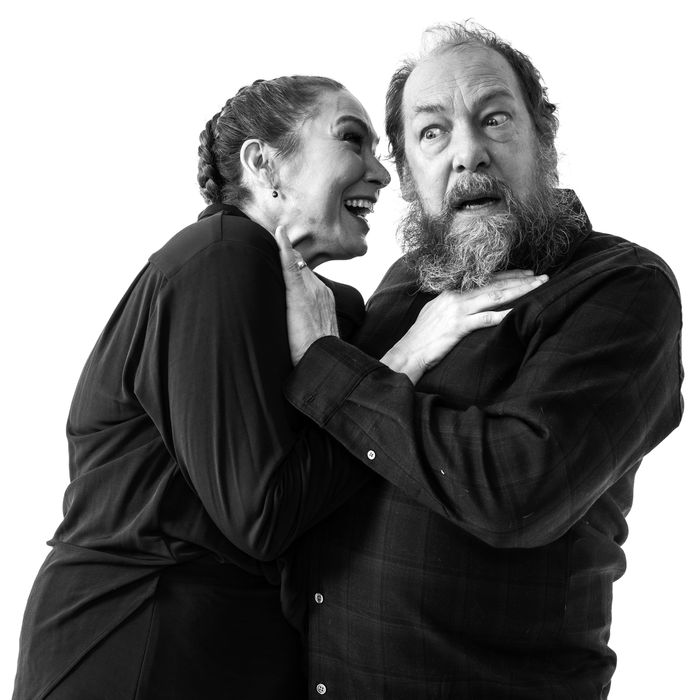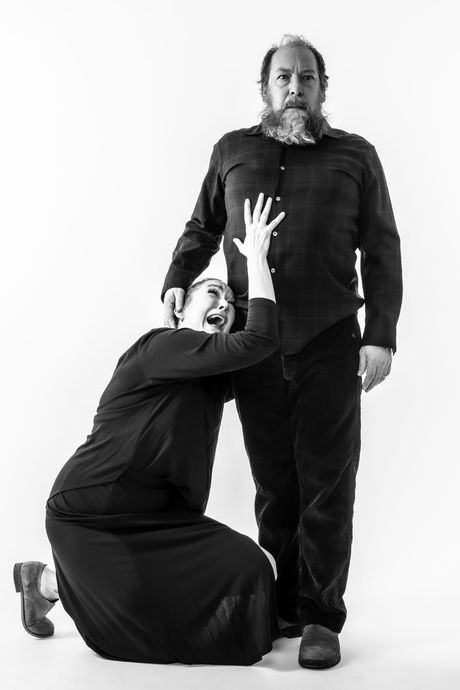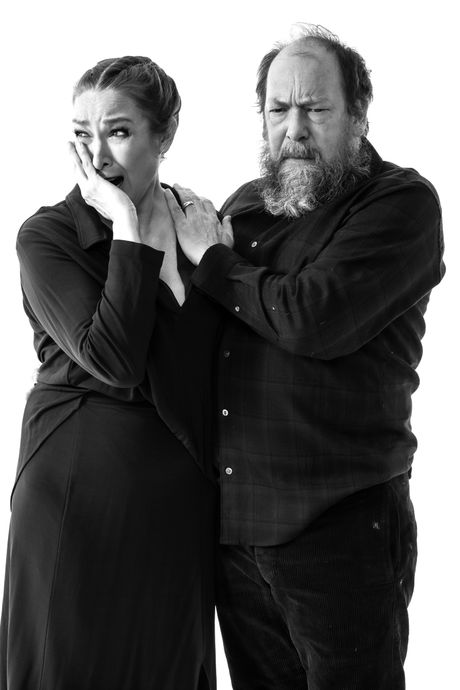
The first time Elizabeth Marvel saw Bill Camp, he was a college dropout, and she was a 15-year-old girl making drawings on the floor. It was the mid-’80s, and Beth (he calls her Beth) was a student at Interlochen Arts Academy in Michigan. At this point, Bill had left the University of Vermont and been accepted at Juilliard, but before he went back to school, he and some buddies took a road trip out West to live in a tepee in Colorado. Along the way, they dropped in unannounced on an old pal from UVM who happened to be Beth’s teacher. She was struck by these 20-something guys, the way their long hair and camo shorts seemed like the height of cool. He barely noticed her.
The first time Bill Camp saw Elizabeth Marvel was a few years later. He was still at Juilliard, doing a work-study gig as an audition monitor, and she was one of the young actors hoping to be accepted. The place was crackling with nervous energy, but none of it was coming from Beth. She was sitting in the corner, smoking, without a care in the world. Bill was amazed by this self-assured girl in jeans, Wallabees, and an oxford shirt that was too big for her. He lit her cigarette and wanted to say something charming, but he got nervous and couldn’t find the words.
Beth did get in, and Bill was the one who gave her a tour on her first day. They talked for three hours afterward. But it wasn’t a date, and the many times they got coffee afterward at Cafe La Fortuna, where John and Yoko used to go, weren’t dates, either. Their first date wasn’t until after Bill had graduated. He came back to see a show on campus, and Beth was there, running around barefoot, working as an usher. He was still smitten, and at intermission he asked her out. They went to the Emerald Inn on Columbus, and when a bunch of Beth’s classmates walked in, they left immediately.
Why did they leave? Because, all this time, Beth had been thinking of Bill, too. She thought about him after he graduated. She thought about him when they barely knew each other. She’d been thinking about him ever since her audition, when he gave her a light. “I was hit by a lightning bolt,” she recalls over coffee on a wet Monday evening in a Carroll Gardens backyard. “I’ve always felt there was something inevitable with him. When he and I could finally have a whole evening, I wasn’t going to share it with a bunch of actors.”
We’ve been watching Camp and Marvel for years; they’ve been watching each other for decades. As the young lovers settled into middle age, they became two of the most sought-after performers of their generation. They are character actors, utility players who shine in roles no matter the size. This has made them extraordinarily prolific, particularly in recent years. Since 2011, Camp has appeared in 31 movies and 15 television shows; Marvel has been in 21 films and 14 shows. She is blunt about their mid-career renaissance. “We’re really fucking lucky. We got older as streaming platforms hit, and what they churn out is content,” she says. “They need people to carry the water, and we are water carriers. No muss, no fuss.”
Both are prized for their versatility. Marvel often plays women with a core of cold steel: the president on Homeland, a candidate on House of Cards. She treasures the occasions when she gets to turn herself inside out. As the deadpan sister in The Meyerowitz Stories, she revealed the self-possession in a character viewers might otherwise have written off as a bit of a drip. In Hulu’s Helstrom, she played a mother inhabited by a demon, pouring pure bile into every syllable. Camp is a director’s Swiss Army knife. He excels at playing weary Everymen, as in his breakout turn as a detective on The Night Of, but catch him playing blue bloods, as in Rebecca Hall’s upcoming Passing, and notice how he can smooth himself out like a fine Scotch. Yet when ham is on the menu, he can go as big as anyone. In Dark Waters, he’s a gruff cattle farmer with a voice like apple-cider vinegar and eyebrows that bring to mind an Appalachian Leonid Brezhnev.
The randomness of the business has created fun symmetries for the couple: When Marvel was the president on Homeland, Camp was Gerald Ford in Vice. (They sent selfies back and forth from their respective Oval Offices.) And when Marvel was playing a devil on Helstrom, Camp was playing one on Hulu’s Monsterland. His creepy demon voice was achieved in post; he’s amazed Marvel was able to pull off hers all on her own.
The voice Camp uses in his most famous projects isn’t the one he uses in casual conversation. His real voice is more laid-back, as if Captain Ahab had taken up surfing. Marvel too is crunchier than the power-suited titans she plays. Today, she’s sporting a Marty Feldman hoodie, a sleeve rolled up to reveal the swordfish tattoo on her forearm. (“They dive the deepest.”) Neither is on social media, and the pair are only vaguely aware that there are people on the internet stanning them. Camp shows off a tiny scar on his forehead from a bike accident when he was 11. He was tickled when someone sent him a piece of fan art from Eastern Europe. It was a painting of Mr. Shaibel, the taciturn chess mentor he plays in The Queen’s Gambit, and there on the forehead was the scar. Proof that there are no small roles: A one-inch part of him had been seen 4,000 miles away.
In a sense, to be a famous character actor is to be a theater actor who wants to raise a child in New York. After Juilliard, Camp and Marvel spent the ’90s cutting their teeth on the city’s stage scene. It was a grind—doing one play while rehearsing another, saying yes to anything, even if it paid only $200 a week. “So many actors in their 20s seem to be waiting for that big break,” Camp says. “For us, it was That ain’t gonna happen.” If you weren’t the kind of actor who was going to get cast in Friends, theater was the only game in town.
Both spent the ‘90s in the theatrical trenches, while dating off-and-on; they joke that the entire decade should be off-the-record. Marvel’s first professional role was playing Isabella in Measure for Measure at the 1992 Stratford Shakespeare Fest. (As a young American who’d been brought in by the show’s director, she was not the most popular with the Canadian actresses: “They didn’t like me at all.”) From there, she had a good run of the Bard’s ingénues. Meanwhile, Camp took on dissolute-young-man parts. On two different occasions directors bleached his hair blonde, leading Ben Brantley to twice compare him to Billy Idol. Eventually, the end of the decade saw them become close collaborators with creative minds like Tony Kushner and Ivo van Hove. “We were apprenticing in a way,” Camp said. “We worked with brilliant directors, on these master texts, and that penetrated us and lit the fuse.”
Sometimes the fuse burned out. In his late 30s, Camp was fresh off an acclaimed turn as a heroin-addicted NGO worker in Kushner’s Homebody/Kabul; offstage, he was struggling with his identity outside of the work. “It was like, Who the fuck is this guy? This guy is these characters he’s playing,” he said. “I had run out of gas.” In 2002, he quit acting and joined Marvel in California, where she was working on the CBS procedural The District. The gig did not exactly stretch her skills, but it paid well enough to buy an apartment and help fund her friend’s dance company. She learned the lesson Los Angeles teaches every New Yorker: Not everything has to be so hard. “I was so used to doing theater, sort of cannibalizing myself—chewing, and spitting, and going,” she said. “We never had a moment to reflect in New York. It was just forward motion. Then suddenly I was making money and having everything change.”
After two years away Camp decided to dip his toes back into acting. Kushner had stayed in touch and invited him to reprise his role in a short run of Homebody/Kabul. It was a small enough request, so he took up the offer, and realized he was able to find joy in the craft again. Around the same time, Marvel returned to New York to star in van Hove’s Hedda Gabler. “Beth was the one who pointed out that spending that time with each other and living our lives, that actually feeds the work,” he said. “My life had been neglected. Now my life is so full, it makes whatever I do more honest and accessible.”
The birth of their son, Silas, in 2007 “clarified motivation,” Marvel says. (They had married a few years earlier.) “It gets simple: To send him to a good school, we need to make X amount of money.” With their theatrical pedigrees, the couple found themselves in demand for some of the juiciest bit parts in Hollywood. Marvel was George Clooney’s overlooked wife in the Coen brothers’ Burn After Reading; Camp appeared as a human trafficker in 12 Years a Slave and a demented hobo in Birdman. The latter was one day’s work.
In Lincoln, written by Kushner, Camp and Marvel popped up as a pair of simple country folks mystified by the president’s rambling anecdotes. It’s one of a handful of projects they’ve appeared in together—they have the same agent, which helps—and a rare occasion where they share a scene. “Once in a while, we get to be together,” said Marvel. “It’s fun. Doing theater together was much harder. A play is the worst thing you can do to a family.” As working parents, they developed a rhythm: When one would leave for a job, the other would stay home to take care of Silas. When they worked together, they’d sometimes take him along. “We’re like a three-legged stool,” Marvel says. “We’re very dependent, but most of the time well balanced.”
This fall and winter, nearly every month brought a fresh Camp/Marvel project. In October, Helstrom and The Queen’s Gambit hit streaming within a week of each other; in December, both actors made short appearances in Paul Greengrass’s News of the World; and in January, Passing premiered at the virtual Sundance. In real life, however, they have barely worked in the past 12 months. They have just returned to New York from Vermont, where they rode out the pandemic’s first year at Camp’s sister’s farm. Their lives slowed down — they looked after Bill’s mother and brother, swam in Lake Champlain, took long walks. Camp was offered roles in interesting projects but found himself saying no. “I didn’t feel compelled to have to do anything,” he says. In Vermont, they could simply spend time together, Marvel says, without “the underlying thrum of When is one of us going to go?”
“We’ve had an incredibly fortunate run, with some obstacles,” Camp says of their careers. “We’ve stayed in it through a kind of partnership. Beth is the person I trust most in the world.”
He’s right to do so. When he gets up to use the restroom, I ask Marvel if there’s anything she wants to say while he’s out of earshot. “God, after all this time?” she says. “There’s really nothing.”
More From This Series
- Tony Shalhoub Answers Every Question We Have About Spy Kids
- Marcia Gay Harden Answers Every Question We Have About Her Pollock Oscars Win
- What Was the Asian American Character Actor?







